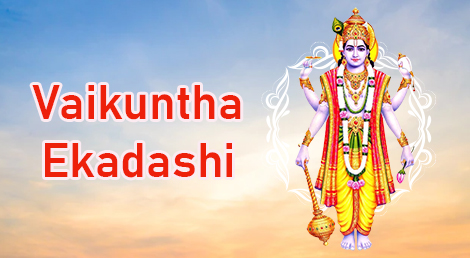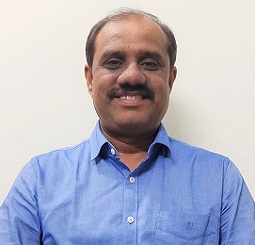Vaikuntha Ekadashi
Vaikuntha Ekadashi
Vaikuntha Ekadashi is an important Hindu ekadashi that occurs on the 'ekadashi' (11th day) of the Shukla Paksha (waxing phase of the moon) in the Hindu calendar month of 'Pausha.' In the Gregorian calendar, this date corresponds to the months of December and January. For Vaishnavism devotees, Vaikuntha Ekadashi is fortunate because it is thought that on this day, the 'Vaikuntha Dwaram,' which is the gateway to Lord Vishnu's dwelling, opens up. As a result, it is thought that anyone who fasts on Vaikuntha Ekadashi will undoubtedly attain the 'Vaikuntha' and will never have to face Yama Raja, the Lord of Death.
Vaikuntha Ekadashi is celebrated with fervour and excitement by Hindu devotees all throughout the country. This ekadashi is known as 'Mukkoti Ekadashi' in the southern states of India, and it falls in the Tamilian calendar month of 'Margazhi.' Vaikuntha Ekadashi is known as 'Swargavathil Ekadashi' in Kerala. On this day, special prayers, lectures, speeches, and yagnas are held at Lord Vishnu's temples throughout the world. The 'Tirumala Venkateswar Temple' at Tirupati, the 'Mahalakshmi Temple' at Gubbi, the 'Sri Ranganathaswamy Temple' at Srirangam, and the 'Rajagopalaswamy Temple' at Mannargudi are well-known in India for their celebrations. The celebrations are particularly lavish in South Indian temples dedicated to Lord Vishnu.
Know the significance of Vaikuntha ekadashi
For Hindus, Vaikuntha Ekadashi is an auspicious and significant day. Several Hindu religious books, such as the 'Padma Purana,' have chronicled the magnificence of this auspicious day. Fasting on the day of Vaikuntha Ekadashi is said to provide the same benefits as fasting on the remaining 23 ekadashis in the Hindu calendar, according to folklore. The Vaikuntha Ekadashi fast is observed by devotees in order to be cleansed of their sins and gain salvation.
Fasting rituals on vaikuntha ekadashi
· Observers follow a stringent fast on Vaikuntha Ekadashi. Throughout the day, they do not eat or drink anything. On 'dashami,' a person who wishes to keep the Vaikuntha Ekadashi fast should only eat once (10th day). On ekadashi, a complete fast is observed. Those who are unable to fast fully may consume fruits and milk. Rice and cereals are not permitted on any ekadashi, for anyone.
· Lord Vishnu receives special prayers, and the observer of this vrat engages in 'Japa' (chanting Vishnu's name) and 'Dhyana' (meditation) (meditation). Devotees stay awake on Vaikuntha Ekadashi night, listening to stories and chanting bhajans in honour of Lord Vishnu.
· Because it is believed that the 'Gates of Heaven' are opened on Vaikuntha Ekadashi, worshippers go to Lord Vishnu temples in the evening. The area surrounding the temple is known as 'Vaikuntha Vaasal,' and Lord Vishnu devotees flock here to seek Lord Vishnu.
Foods being restricted on ekadashi
· The Ekadashi Vrat normally begins on the Dashami Tithi, a day before the Ekadashi Vrat. On the day of Dashami, some followers forego dinner.
· Maintain your chastity.
· On Ekadashi Tithi, get up early, preferably during Brahma Muhurat (which is roughly two hours before sunrise).
· Do Dhyana (Meditation) and then Sankalpa (Pledge) to honestly observe the vrat.
· Rice, wheat, and lentils, as well as nicotine and alcohol, are absolutely forbidden. On this day, avoid eating onions, garlic, or beef.
· Fruits, milk, and vrat recipes such as sabudana khichdi, sabudana vada, kuttu or singhare ki puri, and aloo sabzi are permitted.
· With entire dedication, chant the OM Namo Bhagavate Vasudevaya Mantra as many times as you can.
· Sing hymns dedicated to Lord Vishnu while reading the Vishnu Sahasranam.
· Participate in charitable activities and contribute as much food as you can.
· The Ekadashi vrat is all about self-control. As a result, keep your cool, be courteous, and try to keep your mind from wandering.
What makes vaikuntha ekadashi special
While all of the Ekadashi are auspicious, Vaikuntha Ekadashi is particularly auspicious because it is thought that the Vaikuntha Dwar, or the Supreme Gate of Heaven, opens on this auspicious day. It is said that fasting on the Vaikuntha Ekadashi day is equivalent to fasting on all 23 Ekadashis of the year for a devout Vishnu worshipper or Bhakt.
The Tamil month of Marghazhi or Margasirsa, which falls between the second part of December and the first half of January in the English calendar, falls on Vaikuntha Ekadashi. Fasting on Vaikuntha Ekadashi is thought to free the devotee from the cycle of birth and death, allowing the devotee to achieve eternal Moksha.
Importance of vaikuntha ekadashi
Vaikuntha is the residence of Lord Vishnu, who rests in the Kshira Sagar atop a three-folded serpent named Shesha Naga. The Vaikuntha Dwara remains closed all year. Only on this day is it flung open. It is good to have Lord Vishnu's darshan on this day. Vaikuntha is a religious term that signifies "without insufficiency." To reach Vaikuntha after death, one must let go of one's ego and adore Lord Vishnu. Devotees prepare themselves for salvation by fasting on the Vaikunta Ekadasi day. Several Hindu religious books, such as the 'Padma Purana,' have spoken about the glory of Vaikuntha Ekadashi. The Vaikuntha Ekadashi fast is observed by devotees in order to be liberated from their sins and to obtain salvation.
-
Talk to Astrologer On Call
Starting from 12 per minute only
-
Get Detailed Manual Report
Starting from 250 only
-
Read Article
Read Astrology Articles
- Vedic Astrology,...
- Exp - 12 Years
- English, Hindi
- K.P. Astrology, V...
- Exp - 25 Years
- English, Hindi
- Vedic Astrology
- Exp - 25 Years
- English, Hindi



